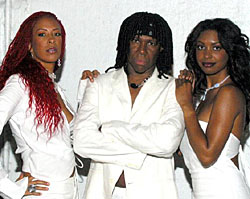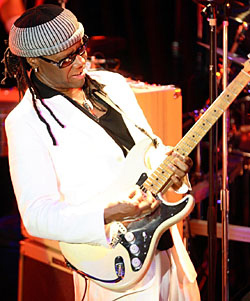Looking back over a long and varied career, Nile Rodgers could pick any number of occasions as his finest hour. But instead of focusing on his chart-topping records with the band Chic or landmark albums he produced for Madonna and David Bowie, he highlights what would seem like a low point.
 |
| Nile Rodgers (above center) & Chic perform next week at Blue Note Tokyo |
"My proudest moment was when the 'disco sucks' movement was at its peak, when we had the song 'Good Times' on the charts," Rodgers, speaking by phone from Connecticut, says of his days in the crosshairs of angry rock fans.
As Chic's guitarist and, with bassist Bernard Edwards, its coproducer, Rodgers was one of the architects of an influential sound that's finally getting its due. A March issue of New York Time Out, ranked Chic third among the city's top 50 musical acts of all time, putting them above Miles Davis and below Duke Ellington and The Velvet Underground. Chic stand out because their R&B wasn't blues-based — they opted for European-derived chord progressions instead.
But in the late 1970s and early '80s, though he and his bandmates had always thought of themselves as a funky R&B group, rock zealots decided they were a disco act. According to the logic of the times, if disco sucked, so did Chic. Their records were publicly destroyed at events like Disco Demolition, held at Chicago's Comiskey Park.
Rodgers embraced the label. The native New Yorker recalls the showdown on the U.S. charts in 1979, which pitted "Good Times" against "My Sharona" by rock's great white hope, The Knack.
"The entire American music business rallied around The Knack. It felt like it was racism, like it was book-burning. They made 'My Sharona' seem like it was the Second Coming," Rodgers says.
"But, historically speaking, look how important 'Good Times' wound up being," he continues. "You have 'Another One Bites the Dust,' 'Radio Clash,' 'Bounce, Rock, Skate, Roll,' 'Rapper's Delight' — all direct derivatives of this one song. I'm not so sure how many songs are derivatives of 'My Sharona.' "
Rodgers notes how Edwards' bass line from "Good Times" was copied to form the foundation of "Rapper's Delight," one of the first rap songs. That seminal track also used the string parts, making "Good Times" possibly the first record to be sampled. Though outraged then, Rodgers has since made peace with hip-hop's cut-and-paste aesthetic.
"There was a culture clash between those whose music was sampled, like Chic and James Brown, and those who were using our music," he says. "Once we sorted out the business and history sorted out the credit, it's really been a symbiotic relationship."
These days, Rodgers alone calls the shots. Edwards died in Tokyo in 1996, following a concert at the Budokan honoring Rodgers. The bassist fell ill, but performed anyway, along with Simon LeBon, Slash and Steve Winwood. The cause of death was pneumonia.
 |
| Nile Rodgers playing live |
"If it had happened in America, it would have been assumed that it was drug usage. The last thing that would happen would be people giving me spiritual help," Rodgers says. "At the police station, I was shocked when I was invited into the room to be with Bernard. They had set up a little altar."
Though Rodgers decided he would no longer play Chic songs, the outpouring of support from Japan changed his mind. The group, now billed as Nile Rogers & Chic, has a new album in the works that Rodgers hopes to spend six months on the road next year supporting. Before that, he and Chic play a series of shows at Blue Note Tokyo this month.
Rodgers' greatest passion now, though, is chairing the We Are Family Foundation, which he founded after 9/11 to promote intercultural understanding. He was politically involved long before he became famous. "I became an antiwar protester during Vietnam," he says. "When I became a member of the Black Panther Party, it wasn't like I just woke up one day and said, 'Hey, I want to be politically active.' "
Like many who opposed the war, Rodgers sensed the withdrawal of American troops from Vietnam presaged better days to come.
"We were fighting for the end of the Vietnam War, for women's rights, gay rights, Native Americans — all of those. The end of the war masqueraded as victory for those causes." he says. "And we started to celebrate our victories."
With that, the era of the protest song gave way to the hedonism of the disco years. "The 'Celebratory '70s' were really what the whole disco thing was about," Rodgers says. "Our lyrics are a direct reflection of the last time in America that it seemed like there was a national celebration."
But the party was done in by its excesses. The nightclub Studio 54 became a symbol of cocaine-fueled depravity that Rodgers believes has been anything but exaggerated. Dancing, he says, was often the last thing on the minds of regulars.
"Multiple sex partners, tons and tons of drugs — it was all standard fare," he recalls. "If friends, who I won't name because they're really famous, hadn't achieved what they planned to achieve in the night — and this was every single night — they started to get aggressive."
Following Chic's split, Rodgers became an in-demand producer after David Bowie convinced the world that the guitarist didn't have a reverse Midas touch. Bowie's "Let's Dance," the 1983 record he coproduced with Rodgers, proved to be the best-selling album of his career. Soon, others came knocking — notably Mick Jagger, Diana Ross, Debbie Harry, INXS and Madonna, for whom Rodgers produced the 1984 album "Like a Virgin." On Duran Duran's album "Notorious" (1986) Rodgers plays guitar, which he says is key to the "Nile Rodgers sound." And it's definitely that sound that fans remember him by.
"I feel like I've achieved the greatest dream a songwriter could ever achieve," Rodgers says. "I can go to any country in the world, walk up to the stage and go, 'One, two, three, awww . . ." and the entire crowd goes, 'Freak out!' How many songwriters dream of having something like that happen?"
If you're a child of the 1970s with any, uh, mirror balls, you're probably not afraid to admit to having once owned a leisure suit and some gold chains.
But chances are you're glad there was a cure for "Saturday Night Fever" before word got around about you stylin' and profilin' like John Travolta's Tony Manero, the Brooklyn icon of bad taste from the 1977 film that took disco mainstream. No offense to unrepentant disco lovers, but there are certainly more folks who'd be proud to say they caught The Sex Pistols on their one and only tour of America than who'd brag about making it past the velvet ropes of Studio 54, the glittering epicenter of disco decadence.
Why? Because The Pistols and punk are cool — and always have been. But disco? Well, disco will suck until we make peace with our past.
Rarely has a musical movement been so despised and so immune to rehabilitation. Old-school rock 'n' roll might have been scorned in the early days by moral guardians who feared the societal decay it might cause. But its unacceptability only increased its cachet among fans. Even metal, which is routinely associated with knuckle-dragging macho lunkheads, gets more respect than disco.
It's ironic that the "disco sucks" movement, initiated by rock fans and disc jockeys who feared the airwaves would soon be dominated by dance-oriented grooves, was such a divisive force in musical history. Musicians like Chic guitarist Nile Rodgers, who never asked to be a poster child for disco, have spoken of the sound's unifying power. White, black, male, female, gay, straight — all were welcome to the party.
The party-crashers, however, held sway. Rodgers, who says disco was never a dirty word in his book, recalls a magazine-sponsored soiree at which none of the assembled journalists and music industry types dared enter a room labeled "disco." Defiant, he and Chic bassist Bernard Edwards crossed the threshold.
"They were all afraid of being associated with disco. How could journalists be that worried about what somebody says? Bernard and I thought, 'Wait a minute! We come from rock 'n' roll. We're rebels. We don't care,' " Rodgers says. "Well, Bernard and I happily walked into that room, and we were the only two people in there. Though we never thought of ourselves as a disco band, that night we proclaimed ourselves one."
It could be argued that Rodgers paid dearly for taking that step, but history suggests otherwise. Maybe it's time to let bygones be bygones. Shall we dance?